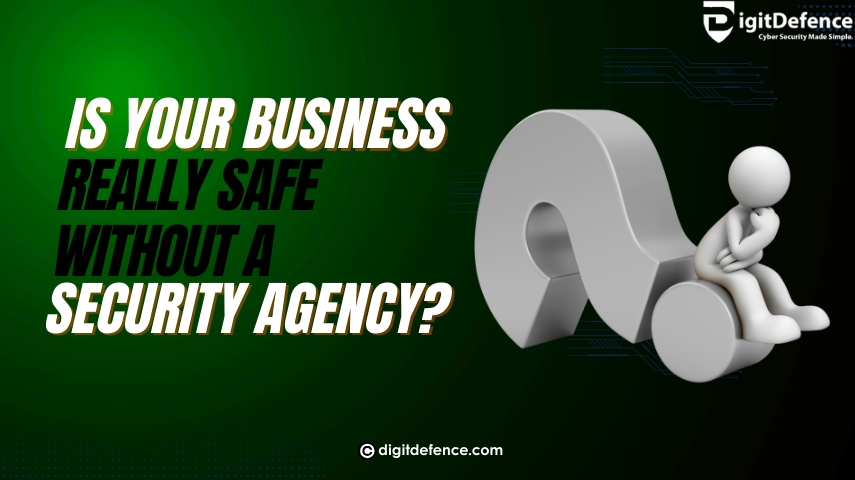
One careless click, an unpatched server, or a cloud account left on default settings, that’s all it takes for attackers to gain access to your systems and sensitive data. Once inside, the damage spreads quickly: disrupted operations, stolen information, and customers questioning whether they can trust your business.
The costs are rising too. According to IBM’s 2024 Data Breach Report, the average global cost of a breach is close to ₹40 crore. And that figure doesn’t even capture the reputational harm, regulatory fines, or the months of disruption that follow.
Yet many companies still downplay the importance of expert support, assuming they’re “too small to be targeted” or that basic antivirus is enough. The reality? Attackers don’t care about business size. Outdated tools can’t keep up with modern cyber threats. Without professional security services, most businesses leave critical vulnerabilities wide open.
Common Problems Businesses Face Without a Security Agency
1. Greater Risk of Data Breaches
Without dedicated oversight, weaknesses in systems often go unnoticed. Weak passwords, exposed databases, and misconfigured networks create easy entry points for cybercriminals. By the time issues are detected, the damage is often already done.
2. No 24/7 Threat Monitoring
Cyber criminals don’t keep office hours. A breach at midnight may go undetected until the next morning, giving attackers hours or days to spread across systems. Without a Cybersecurity agency providing continuous monitoring, businesses cannot respond in real time.
3. Compliance Gaps and Legal Risks
Industries today operate under strict data regulations such as GDPR, PCI DSS, and HIPAA. Missing even small requirements can lead to fines, lawsuits, or loss of licenses. Compliance management services help businesses stay aligned with evolving standards and avoid costly penalties.
4. Limited Expertise and Outdated Tools
Small and mid-sized businesses rarely have a full in-house security team. IT staff juggle daily operations while patching systems, leaving little time for proactive defense. Relying on outdated antivirus or firewalls alone is not enough to stop today’s ransomware, phishing, or insider threats.
Why Businesses Need Professional Security Services
Proactive Threat Detection and Risk Management
Instead of waiting for attacks, security agencies scan networks, cloud platforms, and endpoints continuously. They spot unusual behavior, identify vulnerabilities, and patch weaknesses before attackers can exploit them.
Faster Response During Incidents
Even the strongest defenses can be breached. What matters is how quickly an incident is contained. A professional security team can isolate affected systems, minimize downtime, and reduce the overall impact.
Support for Compliance and Regulations
Agencies help businesses interpret industry standards, prepare for audits, and implement controls that keep data safe. This not only reduces legal risks but also builds credibility with clients and regulators.
Core Cybersecurity Services That Strengthen Defenses
Endpoint and Network Security
Every laptop, phone, and network connection is a potential entry point. Cybersecurity Services like endpoint protection, firewalls, and intrusion detection systems prevent attackers from moving freely across your systems.
Cloud Security and Data Protection
As more workloads move to the cloud, securing them has become critical. Agencies help configure accounts properly, encrypt data, and monitor for suspicious access. Cloud security closes one of the most common loopholes in modern businesses.
Risk Assessment and Vulnerability Testing
Regular risk assessments and penetration tests simulate real-world attacks to uncover blind spots. The insights provide actionable steps for improving defenses and preparing for new threats.
Continuous Monitoring and Incident Response
Cybersecurity doesn’t stop after setup. Agencies provide 24/7 monitoring through Security Operations Centers (SOC) and Managed Detection and Response (MDR). This ensures attacks are detected and addressed the moment they happen.
How Security Services Help Businesses Stay Resilient
Reducing financial and reputational damage
Strong defenses lower the likelihood of breaches, reduce recovery costs, and protect brand reputation.Building trust with customers and partners
Clients and stakeholders want assurance their data is safe. Demonstrating strong cybersecurity practices boosts trust and long-term business relationships.Ensuring long-term continuity
Cybersecurity isn’t a one-time project. Ongoing monitoring and regular updates help businesses adapt to new threats while maintaining smooth operations.
Why Choose Digitdefence as a Security Partner
Digitdefence is one of the leading names in business cybersecurity agencies, trusted by startups, SMEs, and enterprises alike. Unlike vendors who only sell tools, Digitdefence focuses on strategies that match real-world business risks.
Tailored Solutions for Every Business
From small firms handling customer data to enterprises with complex IT environments, Digitdefence builds custom solutions that address unique risks and compliance needs.
Proactive Monitoring and Clear Reporting
Clients benefit from 24/7 monitoring, quick threat response, and easy-to-understand reports. Transparency ensures decision-makers always know what’s being done to safeguard their business.
Proven Expertise and Recognized Standards
With experience rooted in frameworks like NIST, ISO, and Zero Trust, Digitdefence delivers measurable outcomes, fewer breaches, reduced costs per incident, and improved compliance.
Cyber threats are not slowing down. Ignoring professional support leaves businesses exposed to higher risks, greater costs, and loss of customer trust. The smarter choice is to partner with a trusted cybersecurity agency that provides expertise, monitoring, and proactive defense.
With Digitdefence, businesses don’t just protect data, they gain the confidence to grow securely, knowing their operations can withstand today’s and tomorrow’s threats.
Security isn’t just an IT concern anymore; it’s a boardroom priority. The real question isn’t whether your business needs a security partner, but how long you can afford to operate without one.
GET A FREE SCAN FROM DIGITDEFENCE!
